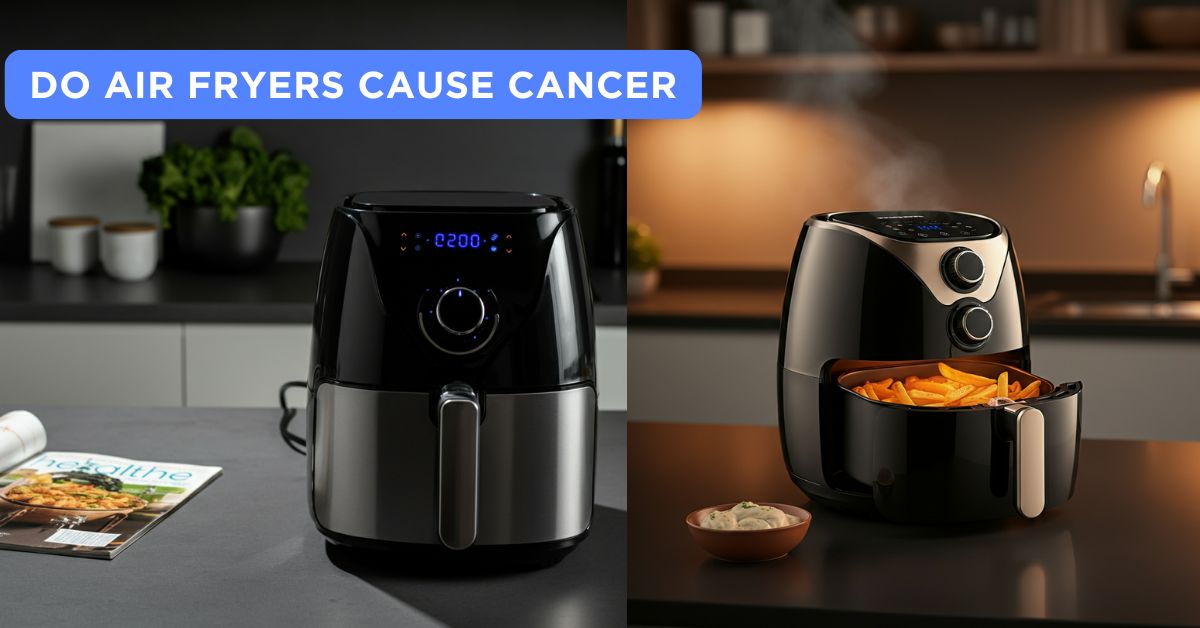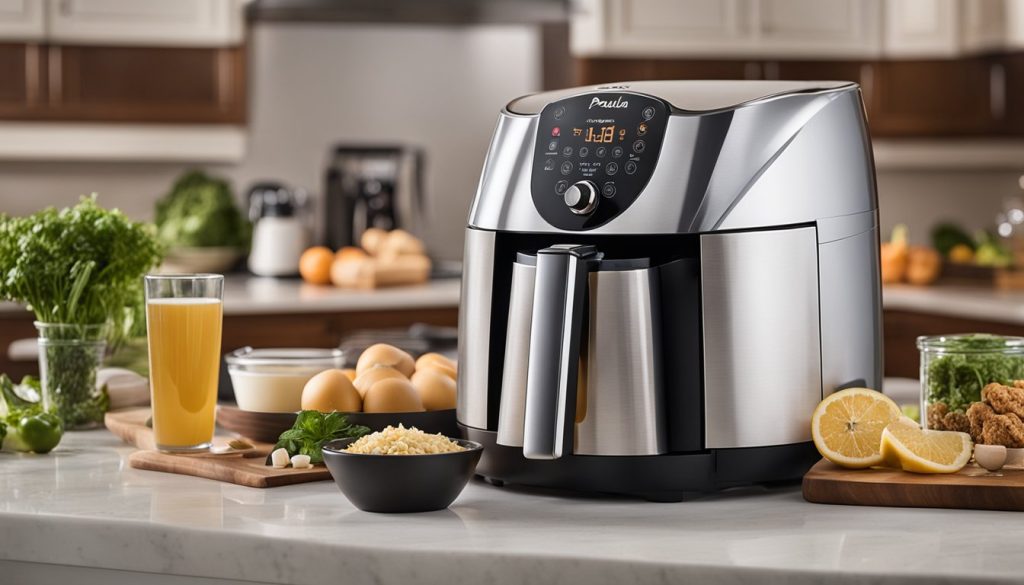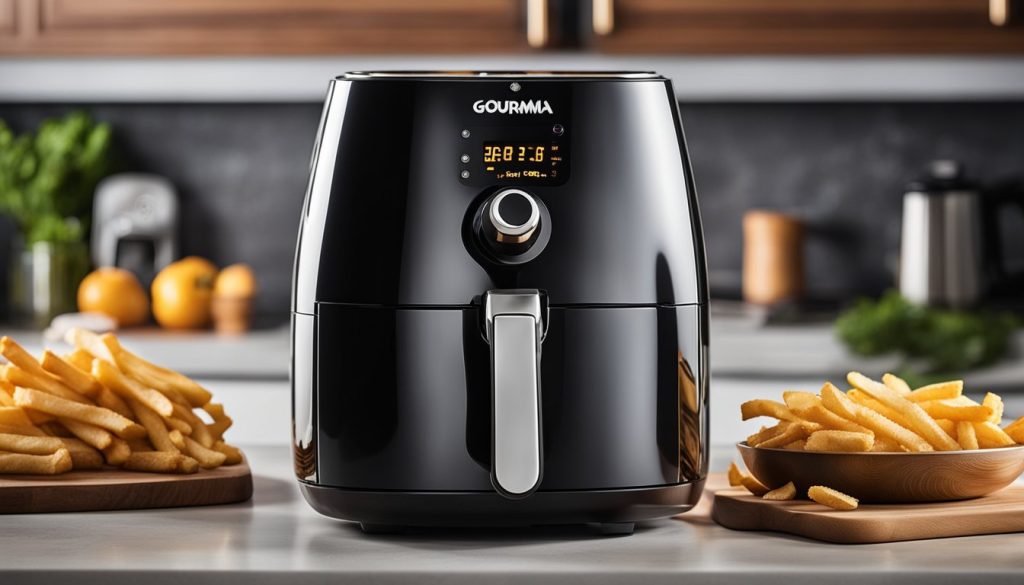The air fryer has taken American kitchens by storm. It promises the crispy, golden goodness of our favorite fried foods – like French fries and chicken wings—but with a tiny fraction of the oil. It’s faster than an oven and cleaner than a deep fryer. It seems like the perfect kitchen gadget.
But maybe you’ve stumbled upon a scary headline or a worried comment in a Facebook group that made you pause. It’s a question that can plant a seed of doubt in your mind: Do air fryers cause cancer?
It’s a serious question, and you deserve a straightforward answer, not more confusion. When it comes to our health and the food we feed our families, we need facts, not fear.
Let’s clear the air right away. The simple answer is no, air fryers as a device do not cause cancer. The concern isn’t about the machine itself. It’s about a chemical that can form when you cook certain types of food at high temperatures, no matter if you’re using an air fryer, an oven, or a deep fryer.
The truly good news? Your air fryer is actually one of the safest ways to cook these foods. In this guide, we’ll walk through the science in plain English, explore what the real risks are, and show you how to use your air fryer with total confidence.
The Real Story: Understanding a Chemical Called Acrylamide
The entire conversation about air fryers and cancer risk boils down to one chemical: acrylamide.
Acrylamide isn’t an ingredient added to your food. It’s a substance that forms naturally from sugars and an amino acid (a building block of protein) that are already present in many plant-based foods. This happens during high-temperature cooking methods like frying, roasting, or baking.
Think about what happens when you toast a slice of bread. It starts soft and pale, and the heat turns it brown, crispy, and flavorful. That browning process is a set of chemical reactions, and acrylamide can be an unwanted byproduct of that delicious transformation.
Why is Acrylamide a Concern?
Scientists first became concerned about acrylamide in food around 20 years ago. In studies where lab animals were exposed to very high levels of acrylamide (far more than a human would ever get from food), they found it could increase the risk of developing cancer.
Because of these findings, major health organizations like the U.S. National Toxicology Program and the International Agency for Research on Cancer classify acrylamide as a “probable human carcinogen.” The word “probable” is key. It means there’s enough evidence to suggest we should be cautious and try to limit how much of it we consume, even though the link in humans isn’t as crystal clear as it is in animal studies.
So, the goal isn’t to eliminate it completely—which is nearly impossible—but to reduce it where we can.
Where Does Acrylamide Come From? The Cooking Magic Behind It
Acrylamide is created during a process that chefs and food scientists call the Maillard reaction. This sounds fancy, but you see it every day. It’s the reaction between sugars and an amino acid called asparagine when heated above 250°F (120°C).
The Maillard reaction is responsible for the amazing flavors and colors in many of our favorite foods:
- The golden-brown crust of a freshly baked loaf of bread.
- The savory, seared outside of a grilled steak.
- The deep, rich aroma of roasting coffee beans.
- The irresistible crunch of a potato chip.
The problem is, the same reaction that makes these foods delicious can also create acrylamide. The foods that are most likely to form it are starchy ones that are rich in carbohydrates and asparagine.
The top sources of acrylamide in the average American diet include:
- Potato Products: French fries and potato chips are the biggest offenders.
- Grain-Based Foods: Toast, breakfast cereals, cookies, crackers, and biscuits.
- Coffee: The beans are roasted at high temperatures, which creates acrylamide.
It’s important to know that boiling, steaming, or microwaving food rarely creates acrylamide because these methods use water and lower temperatures.
Air Fryer vs. Deep Fryer: Which One is Safer?
This is the most important comparison, and it’s where your air fryer truly proves its worth. The fear about air fryers is completely backward when you compare them to the traditional way of making “fried” food.
A deep fryer works by plunging food into a vat of extremely hot oil, often between 325-375°F (160-190°C). This total immersion in hot oil for a prolonged period creates the perfect storm for acrylamide formation.
An air fryer, on the other hand, is like a small, super-charged convection oven. It cooks by circulating scorching hot air all around the food. This method is incredibly efficient. It cooks food much faster and requires only a light spritz of oil, if any at all.
This difference has a massive impact on acrylamide levels. Scientific research has looked at this exact question. One landmark study published in the Journal of Food Science found that air frying potatoes can reduce the formation of acrylamide by as much as 90% when compared to deep frying them in oil.
The verdict is clear: If you’re swapping deep-fried foods for air-fried versions, you are making a huge step toward reducing your acrylamide intake. Your air fryer is the hero here, not the villain.
What About Other Concerns? Plastics and Coatings in Your Air Fryer
The conversation around air fryer safety sometimes shifts from the food to the appliance itself. Are the materials it’s made from, like the non-stick basket, potentially harmful? Let’s tackle that head-on.
The Truth About Non-Stick Coatings (PFAS/PFOA)
Most air fryer baskets have a non-stick coating to make cleanup a breeze. These coatings are often a type of material that falls under the broad category of PFAS, which are sometimes called “forever chemicals.” In the past, a chemical called PFOA was a common part of this manufacturing process.
The concern is that if these coatings are heated to extremely high temperatures—we’re talking over 500°F (260°C)—they can start to break down and release fumes that could be harmful.
However, this is highly unlikely to happen with an air fryer for two simple reasons:
- Air fryers don’t get that hot. The vast majority of air fryers have a maximum temperature setting of 400°F (200°C), which is well below the temperature at which these coatings degrade.
- Modern coatings are safer. Reputable brands sold in the U.S. have phased out the use of PFOA in their cookware coatings due to health concerns and consumer demand.
The only real risk comes from a physically damaged basket. If the non-stick surface is heavily scratched, flaking, or peeling, it can no longer do its job properly and should be replaced.
A Note on BPA in Plastics
BPA (Bisphenol A) is another chemical that has been used to make plastics hard and durable. Over the years, concerns have been raised about its potential health effects.
The good news is that the market has responded. It is now standard practice for kitchen appliance manufacturers to use BPA-free plastics, especially for any parts that might come into contact with food. When you buy a new air fryer from a well-known brand, you can almost always find a “BPA-Free” label on the box or in the product description, giving you extra peace of mind.
Your Guide to the Safest Air Frying: 6 Simple Rules
Feeling better? You should be. Your air fryer is a fantastic tool for healthier cooking. To make it even safer and to minimize acrylamide formation as much as possible, just follow these simple tips.
1. Go for Golden, Not for Brown
This is the number one rule. When you’re air frying starchy foods like potatoes or even just toasting bread, aim for a beautiful golden-yellow color. Stop cooking before it gets dark brown or burnt. A darker color is a visual sign of higher acrylamide levels.
2. Don’t Crowd the Basket
It can be tempting to pile everything in at once to save time, but this is a mistake. An overcrowded basket prevents the hot air from circulating freely, leading to soggy, unevenly cooked food. This also forces you to cook it for longer, which can increase acrylamide. For the best (and safest) results, cook in a single layer, even if it means doing a couple of batches.
3. Give Your Potatoes a Bath
This is a brilliant trick for making homemade french fries. After you cut your potatoes, let them soak in a bowl of cold water for 15 to 30 minutes. This simple step rinses away some of the surface sugars that are needed for acrylamide to form. Just be sure to pat them completely dry with a paper towel before you put them in the air fryer.
4. Temperature Matters
Hotter isn’t always better. Stick to the temperatures recommended in your recipe. If you’re just winging it, start with a more moderate temperature, like 360°F, and check on your food often. You can always increase the heat for the last few minutes to get that perfect crisp.
5. Choose Your Basket Material
If you’re still worried about non-stick coatings, you have other great options! More and more brands are offering air fryers with baskets made from different materials. Stainless steel baskets are incredibly durable and completely inert. Ceramic-coated baskets are another fantastic choice, known for being free from all types of PFAS, PFOA, and other chemicals.
6. Treat Your Basket with Care
To protect your non-stick coating and make it last, always clean it gently. Use a soft sponge or cloth, not steel wool or harsh scouring pads. And avoid using sharp metal utensils to get food out of the basket; opt for silicone or wood instead. If you see deep scratches or signs of peeling, it’s time to order a replacement basket from the manufacturer.
Frequently Asked Questions (FAQ)
Here are quick answers to some of the most common questions people have.
Is using an air fryer healthier than using an oven?
An air fryer’s main advantage is over deep frying, where it drastically cuts fat and calories. Compared to a conventional oven, both are healthy cooking methods that use dry heat. However, since an air fryer cooks faster due to its smaller size and powerful fan, it might produce slightly less acrylamide than an oven for the same food. Both are excellent choices for healthy cooking.
Does cooking meat in an air fryer cause cancer?
The concern about acrylamide is almost entirely related to starchy plant-based foods. Meat, fish, chicken, and most vegetables are very low in the specific sugar-and-amino-acid combination that forms acrylamide. While cooking meat at very high temperatures can form other compounds (called HCAs and PAHs), this is a risk with any grilling or broiling method, and an air fryer is not considered riskier than those.
What do the FDA and American Cancer Society say?
No major health organization has issued a warning against air fryers. Their advice focuses on reducing overall acrylamide consumption, regardless of the appliance used. The recommendations from bodies like the U.S. Food and Drug Administration (FDA) perfectly support the safe-use tips outlined above: avoid burning or overcooking starchy foods, aim for a golden color, and eat a balanced diet. An air fryer is a tool that helps you follow that advice.
Final Thoughts: Cook with Confidence, Not with Fear
The idea that your air fryer might cause cancer is a prime example of a health scare that gets twisted as it spreads online. When you dig into the facts, the opposite is true.
The real concern is a chemical called acrylamide, which can form in starchy foods during any kind of high-heat cooking. Far from being a source of this problem, the air fryer is a powerful solution.
By using an air fryer, you can:
- Slash your fat and calorie intake dramatically compared to deep frying.
- Reduce your exposure to acrylamide by a massive amount—up to 90%—compared to deep frying.
- Cook food faster than a conventional oven, which may offer an additional small safety benefit.
Healthy living isn’t about being afraid of our kitchen tools. It’s about understanding them. By cooking smart—choosing a golden-brown finish, not crowding the basket, and keeping your machine clean—you can embrace your air fryer for what it is: a brilliant appliance that makes delicious, convenient, and healthier food.
So, go ahead and enjoy that crispy batch of air-fried potatoes. You’ve made a great choice for your health and your taste buds.


